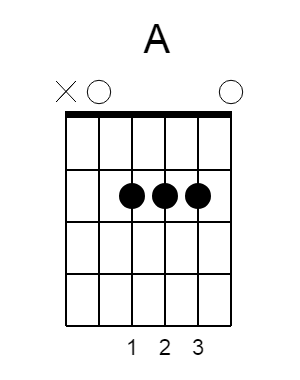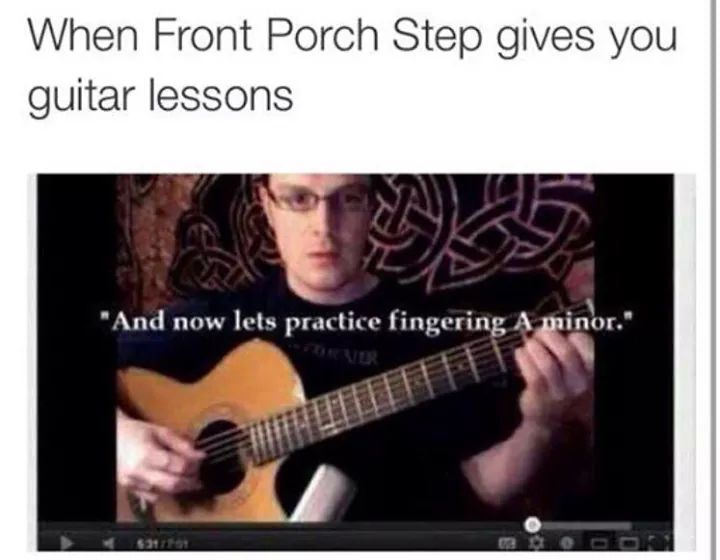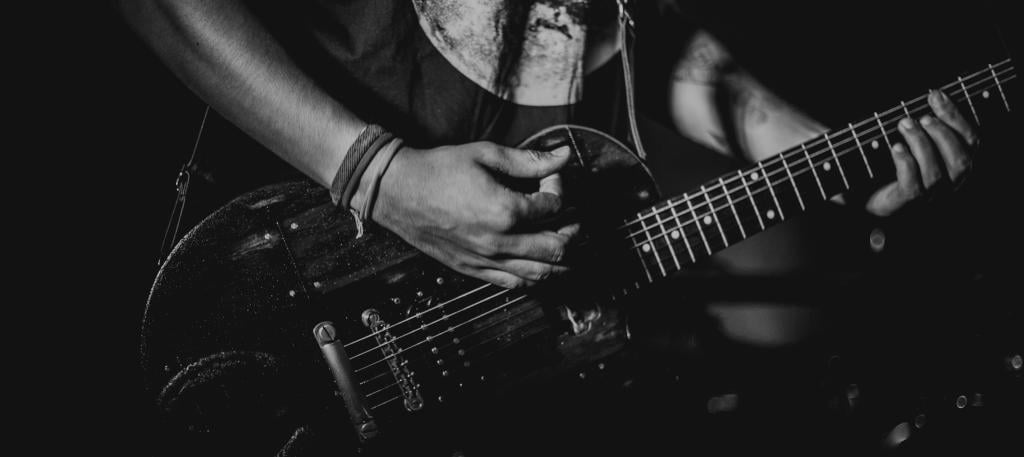Recently I was looking for content ideas for my blog and I came across an article that was teaching beginners how to play electric guitar.
Holy crap it was terrible.
I decided to check out what other blogs write on this topic and honestly I was shocked. The articles contain no value whatsoever. They are only trying to make naive beginners sign up for their courses and newsletters.
This is pretty sad and I honestly feel bad for those poor beginners who are looking for the basic fundamentals of playing electric guitar. I feel like I MUST write an article to give beginners get started with electric guitar.
In this article you will find ACTIONABLE tips and tricks that will teach you the basic fundamentals of electric guitar.
In this article you WILL NOT find anything about equipment-related stuff.
What is the difference between acoustic and electric guitar?
In acoustic guitars, the sound produced by strings is amplified by the hollow body. The bigger the body – the deeper and louder the sound.
Simple.
In electric guitar the sound is picked up by the pickups (surprise surprise) and is transmitted through the electronics to the output device like speakers or whatever you are using. Optionally you can use pedals to modify the sound. You can add different effects like distortion, overdrive, wah-wah, delay etc.
Playing electric guitar as a beginner
As a beginner, it’s really easy to get started with an acoustic guitar. You learn a couple of chords, practice some strumming patterns, maybe learn a simple riff of your favorite song – and you’re good to go. Once you learn how to strum and play a couple of chords – you’re almost rock star.

There are not many things you can do wrong except messing up your strumming rhythm or failing to play a chord (or upsetting your cat).
Then you decide to move on and try playing an electric guitar. If you are using clean sound (no effects) then it’s not any different from playing an acoustic guitar. You just strum that rhythm, press those chords and get a nice, clean sound.
However, all hell breaks loose when you get to strum an electric guitar with distortion effect. Suddenly instead of a nice sound A major chord you get a crazy noise just as if an airplane is taking off next to you.
Don’t yet have an electric guitar – no problem, they are not even that expensive. Check out these affordable electric guitars and pick your favorite!
One of the major challenges beginners face is muting strings.
To be fair, sometimes you have to mute them even on an acoustic guitar.

In the example of A major chord, the E string must not sound at all. The E note isn’t a part of A major chord so if you let it sound it’s going to ruin the chord. That’s why you see a cross right there.

However it becomes a big deal if you are trying to play with distortion or overdrive effects. All the strings start ringing out when you don’t want them to and it sounds like a total disaster.
The answer is palm muting.
This is a technique that you must master if you want to learn electric guitar.
Let’s look what Claus Levin thinks about palm muting.
Remember that mastering palm muting doesn’t happen overnight and requires practicing (as anything else really).
What else is different about electric guitar?
Usually electric guitars have more frets than acoustic ones which allows you to play higher notes. This is why an electric guitars are great for learning soloing.

For those who’ve been living in a cave the last few years and don’t get the meme:
Obviously, different sound from pedal effects opens you a whole new world of opportunities of what you can do with an electric guitar, but that’s a topic for another day.
So how do you learn to play electric guitar?
To be honest, it’s not much different from learning acoustic guitar, except that you need to learn palm muting and you have access to higher notes.
You still have all the same strings, notes, chords and most techniques are applicable to electric guitar.
Since everybody is at a different level, it’s not easy to give specific tips that will work for everyone.
For this reason, I’ll share my 5 most valuable tip that are based on my 9 year experience of playing the guitar and will be useful for any level of guitar player.
- Play the guitar consistently
I can’t stress enough how important consistency is. Honestly, you will barely see any progress if you practice once or twice a week. The magic pill to mastering the guitar is practicing every day (and having fun).
- Pay attention to smallest details
Practicing a lot is important, but at the same time you actually need to pay attention to the mistakes you make and make an effort to fix them. In my experience, the biggest aha moments and progress leaps came from paying attention to the tiniest details. It can be the way you hold your pick, the angle between your fretting hand fingers and the fretboard, your body position, picking accuracy and efficiency. Every tiny movement you make has to be perfect.
- Use a metronome
Playing in time is as important as playing correct notes. If not more important. A metronome teaches you two things: how to play in time and how to play fast. Don’t use it and you will quickly learn how to suck at guitar.
- Start with learning fun stuff
Keep yourself inspired playing the guitar by learning cool songs. I don’t know what music genre you prefer, but you could start with AC/DC songs. They are cool and easy to play. Here you can find a list of easy-to-play songs for beginners.
- Learn minor pentatonic scale
This is the most common set of notes used for soloing in multiple music genres like rock, metal etc. Since you are playing electric guitar, it makes perfect sense to get yourself familiar with scales and notes.
I wrote an in-depth guide on how to learn to improvise on guitar. As a bonus, practicing scales significantly improves your ability to distinguish notes and before you know you will be able to play by ear. Nice bonus, hu?
Check out:
- EVEN MORE TIPS (a bit advanced)
- Best affordable acoustic guitars
- How to use a metronome
- Seagull S6 Review – Recommended Acoustic Guitar Choice For Intermediate Players
- Electric Guitars With Best Quality vs Price Ratio
So here it is, boys and girls.
I hope this article was useful to you and you will use my suggested tips.
If you have any questions – you know where the comment section is.


